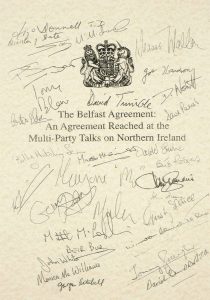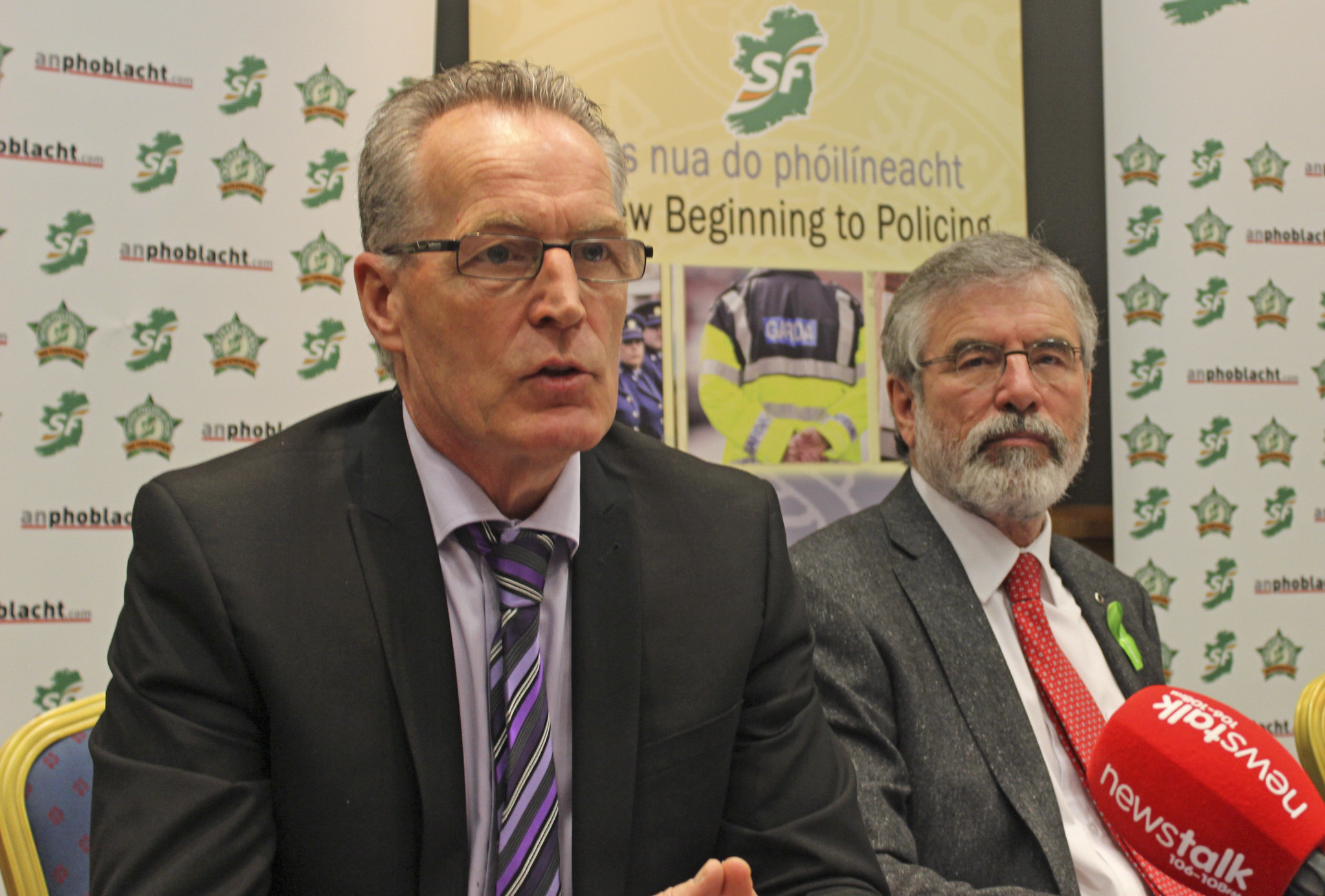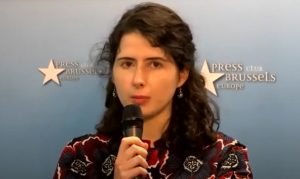14 Apr 2023 | Ireland, Northern Ireland, Opinion, Ruth's blog, United Kingdom

A copy of the Belfast Agreement signed by the main parties involved and organised by journalist Justine McCarthy of the Irish Independent newspaper. Photo: Whyte’s Auctions
Every day the professional staff at Index meet to discuss what’s going on in the world and the issues that we need to address. Where has been the latest crisis? What do we need to be aware of in a specific country? Where are elections imminent? Do we have a source or a journalist in country and, if not, who do we know? During these meetings we are confronted with some of the worst heartbreak happening in the world. Journalists being murdered, dissidents arrested, activists threatened and beaten, academics intimidated and while we know that we are helping them by providing a platform to tell their stories it can be soul destroying to be confronted by the actions of tyrants and dictators every day.
Which is why grabbing hold of good news stories helps keep us on track. The moments when we’ve helped dissidents get to safety, when a tyrant loses, when an artist or writer or academic manages to get their work to us. These are good days and should be cherished for what they are – because candidly they are far too rare.
It’s in this spirit that I’ve absorbed every news article, reflection and op-ed column discussing events in Northern Ireland 25 years ago. I was born in 1979, my family lived in London – the Troubles were a normal part of the news. As I grew up, the sectarian war in Northern Ireland seemed intractable, peace a dream that was impossible to achieve. But through the power of politics, of words, of negotiation, peace was delivered not just for the people of Northern Ireland but for everyone affected by the Troubles. That isn’t to say it was easy, or straightforward and that it doesn’t remain fragile, but it has proven to be miraculous and is something that we should both celebrate and cherish.
The Good Friday Agreement delivered the opportunity of hope for the people of Northern Ireland. It gave us a pathway to build trust between communities and allowed, for the first time in generations, people to think about a different kind of future. For someone who firmly believes in the power of language, who values the world of diplomacy and fights every day for the protection of our core human rights there is no single moment in British history which embodies those values more than what happened on 10 April 1998.
We can only but hope that other seemingly intractable disputes continue to see what happened in Belfast on that fateful day as inspiration to challenge their own status quo.
16 Oct 2022 | Greece, Malta, Netherlands, News and features, Northern Ireland, Slovakia
It shouldn’t have taken a murder. Surely it didn’t need a car bomb in a quiet Maltese town. Daphne Caruana Galizia did not need to die for Europe and the rest of the world to take notice of media freedom’s precarious foundations. But to our shame, it did.
Five years ago today, Daphne was murdered by a car bomb that exploded when she was moments from her front door. But the car bomb was only the mechanism by which she was silenced. Daphne was murdered by the opaque but powerful forces that first encourage, before demanding and eventually forcing silence. But she was never rendered mute, even now.
In the years that have followed, Europe has wrestled both with her legacy – what her investigations revealed – as well as the legacy of her killing – what her murder revealed. In the aftermath of similar killings in Northern Ireland (Lyra McKee), Slovakia (Ján Kuciak and Martina Kušnírová), Greece (Giorgos Karaivaz) and the Netherlands (Peter R. de Vries), as well as increased attention on the use of strategic lawsuits against public participation (SLAPPs), Europe has been forced to address an uncomfortable reality: journalists are at risk all across the continent. And so, by extension, is European democracy.
This is the dark light that bathes Europe, a light emanating from the brutal collapse of the rule of law but also a light that can illuminate what is broken. In the five years that have passed since her death, Daphne’s family have had to fight for every inch to demand both justice for Daphne and accountability for Malta. Whether this was to demand a public inquiry, pressing for progress in the criminal investigation, and putting SLAPPs on the European agenda, the rage, sadness and fury has fuelled a reckoning that has helped bring forward a proposed European Commission directive on SLAPPs, a Europe-wide coalition of organisations fighting to upend this form of lawfare, as well as similar movements at a national level.
In the UK, spurred on by Russia’s unlawful invasion of Ukraine, the UK Government announced in July 2022 an anti-SLAPP mechanism that could limit how UK courts are abused to silence critical speech. As we wait to see what happens – especially after the change in Prime Minister and her cabinet – we hope we are at the threshold of something significant. It is important to remember that a number of the libel threats against Daphne were deployed with the aid of London-based legal expertise – SLAPPs cannot be confined within national borders.
But we must return to Malta to remind ourselves of the pitfalls. Recently announced reforms aimed at protecting journalism, including much-vaunted anti-SLAPP protections, have had to be hurriedly frozen by the Prime Minister after being widely derided as inadequate, both in terms of content, falling far short of the proposed EC Directive, and process. The Institute of Maltese Journalists (IGM) had threatened to step away from the Committee of Experts unless “meaningful” consultation takes place. This was echoed by both the International and European Federations of Journalists (IFJ and EFJ) who have joined the call for the legislation to be withdrawn, as reported in Maltese outlet, NewsBook: “no proposal on media legislative reform should be submitted to the parliament without a transparent public consultation. This is all the more crucial in a country where a state holds some form of responsibility for the killing of a journalist.” While appearing to be fuelled by a desire to be the first EU nation to bring forward national legislation responding to SLAPPs, a grimy sense of competitive haste has seemingly triumphed over a commitment to genuine and meaningful protections.
Today, vigils remembering Daphne’s legacy – her life, her writing, and her commitment to the public’s right to know – are taking place across Europe, in London, Valletta, Brussels and Edinburgh to name a few. But wherever we are, we must ensure that by remembering Daphne’s life, we are reminded of our commitment to protect journalists against vexatious legal threats, physical attacks and every act that isolates, demonises or targets them.
Progress is slow and halting and will not proceed from one point to the next without obstruction – Malta’s current reform process is testament to that – however, the greatest way we can honour Daphne is by moving with purpose to ensure what happened to her cannot happen to another journalist. The dark light has illuminated what needs to change and the urgency with which it must change. It should not have taken the murder of a journalist for this to happen and we must not forget the darkness that sparked this push for greater protections, a darkness that robbed a family of the private space in which to mourn, but we must follow where the light leads. For in Daphne’s words, “There are crooks everywhere you look. The situation is desperate.
4 Aug 2022 | News and features, Northern Ireland, Statements, United Kingdom

Gerry Kelly MLA & Gerry Adams TD. Photo: Sinn Fein, CC BY 2.0
Index on Censorship is concerned at the lawsuits that have been filed against journalist Malachi O’Doherty and columnist Ruth Dudley Edwards. Both are being sued individually by Sinn Féin politician Gerry Kelly MLA, who is claiming aggravated damages for comments they each made – on radio and in print respectively – in relation to Kelly’s role in 1983 Maze Prison escape.
“Everyone has the right to defend their good name but as elected representatives, politicians have a duty to display a greater degree of restraint when it comes to taking to legal action against journalists. This is especially true when the contested statements are related to matters of public interest. Lawsuits against journalists can have a serious and damaging impact on media freedom and on our democracy,” said Jessica Ní Mhainín, Policy and Campaigns Manager at Index on Censorship.
Explaining Index on Censorship’s decision to file a media freedom alert to the Council of Europe Platform, Ní Mhainín said: “We are concerned that these lawsuits in particular have several characteristics of strategic lawsuits against public participation or ‘SLAPPs’. SLAPPs involve powerful people – such as politicians – making legal threats or taking legal actions against public watchdogs – such as journalists – in response to public interest speech.”
This is the seventh media freedom alert filed on the United Kingdom to the Council of Europe Platform to Promote the Protection of Journalism and Safety of Journalists this year and the third relating to SLAPPs.
29 Apr 2022 | China, Media Freedom, News and features, Russia, Ukraine
Physical attacks on journalists have increased dramatically over the past year, according to the latest annual report from the Council of Europe Platform on media freedom in Europe.
The platform, of which Index on Censorship is a partner, reports on serious threats to the safety of journalists and media freedom in Europe in order to reinforce the Council of Europe’s response to the threats and member states’ accountability.
The new report, Defending Press Freedom in Times of Tension and Conflict, reveals that the number of cases involving the safety and physical integrity of journalists has jumped by 51% year-on-year, with 82 cases reported to the platform.
Many of the attacks on journalists have taken place during public protests.
“Violence against journalists during street protests is fed by a wave of media bashing and an avalanche of hate speech on social networks – very often prompted by political figures – which directly target journalists, questioning their independence and legitimacy and therefore making them more vulnerable to physical aggression,” the report says.
Overall, the number of alerts in all categories published by the CoE platform has sky-rocketed to 280 in 2021, up from around 200 in 2020 and more than double the level reported in 2016. Of the 280 alerts, 110 related to the harassment and intimidation of journalists.

Index’s policy and campaigns manager Jessica Ní Mhainín
Speaking at the launch of the report, Index’s policy and campaigns manager Jessica Ní Mhainín highlighted cases of impunity in CoE’s report.
“Impunity for crimes against journalists refer to failure of states to identify, prosecute and punish anyone including the assailants and masterminds involved in committing a crime against a journalist,” she said. “Cultures of impunity contribute to self-censorship by making journalists more vulnerable to pressures out of fear of reprisals or harm.”
Some 35 cases of impunity have been registered on the platform since 2015 and two new impunity cases – those of Turkish journalist Uğur Mumcu, murdered in 1993, and Turkish-Cypriot journalist Kutlu Adalı, murdered in Cyprus in 1996 – were added to the impunity category during the year.
“In 2021, we welcomed the Slovak Supreme Court’s decision to overturn the not-guilty verdicts of the suspected masterminds of the 2018 murder of journalist Ján Kuciak and his fiancée Martina Kušnírová. The case will be heard in the Specialized Criminal Court later this year,” said Ní Mhainín.
Last year also saw the publication of a 438 page-report from the public inquiry into the assassination of investigative journalist Daphne Caruana Galizia, which concluded that the state of Malta “must bear responsibility for the assassination because it created an atmosphere of impunity”.
“We once again call on the Maltese authorities and the Commission of Experts to implement the recommendations of the Public Inquiry,” said Ní Mhainín.
Russia, Turkey and Ukraine account for 60% of all the cases relating to impunity on the platform. Last October marked the 15th anniversary of Russian journalist Anna Politkovskaya’s murder.
Ní Mhainín said, “The masterminds of her murder are still at large, sending the incredibly dangerous message that killing a journalist is a low-risk crime.”
Yet impunity is not restricted to these countries.
A BBC Spotlight investigation has uncovered serious concerns over the police investigation and the failure to prosecute those behind the murder of Irish journalist Martin O’Hagan, who was killed in September 2001 for his reporting on paramilitary activities in Northern Ireland. The concerns raised in the programme, which aired on 2 March 2022, came in the wake of several Police Ombudsman reports that uncovered collusive behaviour between the police and loyalists in Northern Ireland. According to the BBC’s investigation, police did not act on important information – including individual names – that were handed over to them within 48 hours of the murder. The journalist’s family are now taking legal action against the Police Service of Northern Ireland (PSNI) and the Ministry of Defence.
“Press freedom is the canary in the coal mine – it is a key indicator of the clear and worrying degree of democratic backsliding that is taking place across Europe,” said Ní Mhainín. “That’s why we once again call on Council of Europe member states to ensure that the highest priority is given to conducting thorough and transparent investigations into all crimes against journalists and we remind member states of the 2016 Recommendation of the Committee of Ministers which requires states ‘adopt appropriate criminal law provisions to prevent impunity’”



